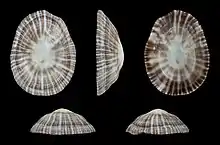Siphonaria pectinata
Siphonaria pectinata, common name the striped false limpet, is a species of air-breathing sea snail or false limpet, a marine heterobranch gastropod mollusc in the family Siphonariidae, the false limpets.[1]
| Siphonaria pectinata | |
|---|---|
 | |
| Siphonaria pectinata | |
| Scientific classification | |
| Kingdom: | |
| Phylum: | |
| Class: | |
| (unranked): | |
| Superfamily: | |
| Family: | |
| Genus: | |
| Species: | S. pectinata |
| Binomial name | |
| Siphonaria pectinata (Linnaeus, 1758) | |
| Synonyms | |
| |
Taxonomic status
_-_Siphonariidae_-_Mollusc_shell.jpeg.webp)
Siphonaria pectinata (Linnaeus, 1758) was thought to be a widespread species with an Amphiatlantic distribution. A recent molecular study clearly distinguished three lineages with no apparent connectivity.[2] These lineages are now treated as three separate species. They are named as S. pectinata, restricted to the eastern Atlantic and Mediterranean, S. naufragum Stearns, 1872 from Florida and the Gulf of Mexico and S. placentula Menke, 1853 from the Cape Verde Archipelago.
The complete nucleotide sequence of the mitochondrial genome of Siphonaria pectinata has been available since 2008.[3] As a result of this study, Grande et al. (2008)[3] proposed that this species should be recognized as a member of the Opisthobranchia rather than the Pulmonata. It is now known that the Pulmonata are actually a group within the former Opisthobranchia and the term Heterobranchia is usually used to clarify this relationship.[4]
Distribution
This species lives high in the intertidal zone on rocky shores in the North Atlantic Ocean, and the Mediterranean Sea. Populations in the Eastern Atlantic in the Gulf of Mexico, Florida and the Florida Keys are now known to belong to the sibling species, Siphonaria naufragum.[2][5]
References
- Gofas, S. (2015). Siphonaria pectinata. In: MolluscaBase (2015). Accessed through: World Register of Marine Species on 2015-10-06
- Giribet, G. and Kawauchi, G. Y., 2015. How many species of Siphonaria pectinata (Gastropoda: Heterobranchia) are there? Journal of Molluscan Studies 1–7. doi:10.1093/mollus/eyv038 Advance Access published 4 September 2015
- Grande C., Templado J. & Zardoya R. 2008. Evolution of gastropod mitochondrial genome arrangements. BMC Evolutionary Biology 2008, 8:61. doi:10.1186/1471-2148-8-61
- Jörger K. M.; Stöger I.; Kano Y.; Fukuda H.; Knebelsberger T.; Schrödl M. (2010). "On the origin of Acochlidia and other enigmatic euthyneuran gastropods, with implications for the systematics of Heterobranchia". BMC Evolutionary Biology. 10: 323. doi:10.1186/1471-2148-10-323. PMC 3087543. PMID 20973994.
- Siphonaria naufragum at Smithsonian Marine Station at Fort Pierce.
- Gofas, S.; Le Renard, J.; Bouchet, P. (2001). Mollusca. in: Costello, M.J. et al. (eds), European Register of Marine Species: a check-list of the marine species in Europe and a bibliography of guides to their identification. Patrimoines Naturels. 50: 180-213
External links
| Wikimedia Commons has media related to Siphonaria pectinata. |
- "Siphonaria pectinata". Gastropods.com. Retrieved 16 January 2019.
- Crocetta F. (2016). "Backdating the confirmed presence of Siphonaria pectinata (Gastropoda: Siphonariidae) along the northern Mediterranean shores, with a discussion on its status in the basin". Marine Biodiversity Records 9: 55. doi:10.1186/s41200-016-0034-5.
- Simone, L. R. L., & Seabra, M. I. G. (2017). "Shell and body structure of the plesiomorphic pulmonate marine limpet Siphonaria pectinata (Linnaeus, 1758) from Portugal (Gastropoda: Heterobranchia: Siphonariidae)". Folia Malacologica 25(3): 147-164. doi:10.12657/folmal.025.012
_-_iNaturalist.org.jpg.webp)